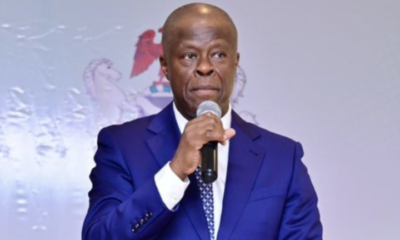Business
Foreign Capital Imports in Nigeria drop by 78%
The National Bureau of Statistics of Nigeria, or NBS, has reported at the start of September that the value of Nigeria’s capital imports fell to $1.29 billion. This means that there is an active decline of 77.88 percent in the value. This is especially troublesome considering the fact that during the first quarter of 2020 the capital import used to be $5.85 billion.
This means that cumulatively, on a year-to-year basis, the drop amounted to a whopping 78.60 percent from what it used to be in the second financial quarter of 2019 ($6.05 billion).
It is no secret that this large decline is largely attributed to the ongoing novel coronavirus pandemic which is currently plaguing the world. Nigeria is not the only country that has been affected by the global problem. Almost every other country in the world is having financial problems with global economies like the US and UK shrinking by 20%. In Nigeria during the period between April and June the Foreign Direct Investment, or FDI, calculated in equities and other capital, has fallen by 30.65 percent on a quarterly and by 33.41 percent on yearly basis. The current number is sitting at $148.59 million. According to NDS, the FDI accounts for almost 12 percent of the total capital that has been imported in the second quarter of 2020. One of the leading causes is portfolio investment (equities, bonds, foreign exchange market, etc). These investments accumulate to 29.76 percent of the total inflow of foreign money. This unit has fallen by an incredible 91.06 percent just between the first and second quarters of 2020 to $385.32 million.
Major capital investment contributor is classified under “other investment” and comprises trade credits, currency deposits, loans, etc. The statistics show that these types of investments account for as much as 58.77 percent of total imported capital or $761.03 million. The decline here is also quite visible as there is a drop of 42.81 percent on quarter to quarter and 48.60 percent on yearly basis.
According to the report made by the NDS, during these times of crisis, Great Britain has become a major capital investor of Nigeria in the second quarter where the inflow of money shows $428.83 million. This is 33.12 percent of the total capital inflow in the second quarter of 2020.
The largest capital importing state is still considered to be Lagos with $1.13 billion or 87.30 percent of the total capital inflow in Q2 of 2020 closely followed by the states of Abuja and Ogun in second and third positions. However, the difference of capital investment here is quite troubling since Abuja has only $145.30 million and the Ogur state is netting $11 million which are 11.20 percent and 0.85 percent of the capital importing total.
The foreign exchange market (Forex, FX) in Nigeria is starting to boom though. Due to the novel coronavirus which has left a huge number of residents unemployed and others locked up in their own homes the number of people who started researching additional ways to generate income has increased by a significant amount. Forex has proved to be a useful instrument in this battle against unemployment. The educational material is freely available online, so it isn’t far from reality that anyone with a decent computer, smartphone, or even a tablet could go through some materials over the internet.
Choosing a proper, licensed broker is also quite an endeavor. However, it is made easier due to the efforts of regulatory bodies that work hard on licensing these firms which afterward have the ability to offer reliable services. If you’re a trader, you can read online forex reviews here to choose your desired broker, test the waters with a demo account, invest, and start trading currency pairs. It is a unique opportunity for people living in developing countries that do not have enough finances to manage the Coronavirus pandemic. This has been successfully done by countries like South Africa, which has introduced its own regulatory body – Financial Services Conduct Authority (FSCA) – that managed to put the country on the global playfield with the South African rand now becoming the 18th most traded currency on Forex globally.
The reason FX is profitable now is because of the Nigerian naira pushing the limits. The currency has become stronger during the last couple of months (everything is comparable) but this can be largely attributed to the fact that the decrease in imports leaves more focus on exports which directly translates to the strengthening of the local currency. However, the margin at which it strengthened leaves something to desire more. Unfortunately, the Nigerian naira has been devaluing for a very long time now and unless something changes in the inner politics of the nation it is not going to improve. The devaluation happens due to the oil prices jumping around constantly. Nigeria is extremely dependent on the crude price. This has gone to the extent where there are multiple exchange rate policies for naira. Currently, it is sitting around N381 which is a 21 point increase from what it used to be prior to the lockdown.
Business
Bank Supports Female Entrepreneurs With Grants
Kolomoni Microfinance Bank has awarded grants to five female entrepreneurs to boost their businesses as part of its commitment to promoting women in business.
The initiative, organized to mark International Women’s Day, was themed “Accelerate Her Growth.”
According to the bank, the decision to support women was inspired by World Bank data, which shows that 41 percent of Nigeria’s micro-businesses are owned by women.
Delivering the keynote address, business strategist, Ebun Akinwale, emphasized that entrepreneurship requires resilience, creativity, and passion.
She illustrated this by recounting her own business challenges and highlighting the critical role passion plays in overcoming obstacles.
The event underscored Kolomoni’s mission to empower women and support small businesses in Nigeria.
Other speakers at the occasion were Odunayo Oyebolu, a seasoned entrepreneur; Victori Ajiboye, a marketing strategist with global experience; and Simi Ojumu, a finance expert.
The beneficiaries said the financial support was a validation of their hard work and a boost of confidence towards scaling through in their businesses.
The winners were selected after sharing their entrepreneurial journeys and presenting business proposals for financial assistance from the bank.
Business
Nigerian SME Awards: Providus, Access, Others Compete For Honor
The 8th edition of the Nigeria Small and Medium Enterprises (SMEs) Summit and Awards (Nigeria SMEAwards) is set to take place in Lagos for the first time in its history, marking a significant milestone for this prestigious event.
Endorsed by the Small and Medium Enterprises Development Agency of Nigeria (SMEDAN), the annual awards celebrate the entrepreneurial spirit driving Nigeria’s economy.
The visionary convener of NigeriaSMEAwards 2025, Adedayo Olalekan, said, “Governors from Zamfara, Sokoto, Ebonyi, Borno, Enugu, Ekiti, Benue, and Kaduna States have all implemented transformative initiatives that have greatly benefitted local enterprises.
“Their contributions will serve as a beacon of inspiration for the nation.”
Speaking at a recent press conference in Lagos, Olalekan emphasised that the event would introduce a fresh and unique approach, moving away from tradition.
“Despite economic challenges, Nigerians continue to show an unwavering commitment to progress”, he said.
He noted that the awards will not only honor outstanding individuals, but also recognise the critical role state governments play in nurturing vibrant SMEs.
“State governments have been instrumental in fostering a supportive environment for SMEs, which in turn benefits both the awardees and the larger economy.
“With major banks like Providus, Access, and First Banks competing for top honors, the 8th NigeriaSMEAwards promises to be a night of celebration, recognising exceptional contributions to Nigeria’s SME landscape”, Olalekan added.
Amid global challenges such as inflation, geopolitical instability, and the ongoing conflict in Ukraine, Nigerians continue to show remarkable resilience.
Their efforts, according to reports, have contributed to job creation, economic growth, and overall prosperity, with SMEs at the forefront of this success.
This year’s awards will recognise governors who have made significant strides in advancing the SME sector within their states.
Business
SMEs Experts Urge MSMEs To Remain Focused
Small and Medium Enterprises (SMEs) consultants in Rivers State have called on entrepreneurs to be focused and avoid distractions.
The experts, who were speaking on the recent developments about the change of leadership in the state, said entrepreneurs need to put more efforts in their businesses in order to break even in the present situation in Rivers State.
Speaking in a chat with The Tide, an international SMEs consultant, Amb. Larry Goodwill Ajiola, said the political moves is capable of distracting SMEs who are not grounded in their businesses, adding that “the serious minded business men and women would utilise the opportunity to increase their revenues”.
Amb Ajiola, who is the President and Chief Executive Officer (CEO) of Rumuomasi Co-operative and Credit Society Limited, Port Harcourt, said, “Rugged entrepreneurs look out for business opportunities in situations around them, whether good or bad”.
He reiterated that the loan facility given to 3,000 SMEs in the state revived and expanded businesses, adding that the empowered businesses should continue to push, no matter the situation.
“credit is a powerful tool for achieving financial security.
“We can only keep imagin the economic value that the over 3,000 MSMEs would add to the positive economic dynamics of Rivers State and the Local Government Areas in terms of Gross Domestic Prooduct (GDP), increased tax returns, employment creation, income distribution, and production of goods and services”, he said.
Another SMEs Expert, a business consultant and SMEs trainer, Mr. Chisom Sam-Orji, in his advice, noted that every SME in the state should realize that change is the only constant thing.
He said SMEs should also know that “tough times never last, but tough people do”, adding the need for every entrepreneur to stay focused on creating value and remain resilient.
“This is not the time to be distracted by every noise around your space, but to maximize every time you have to focus on the essentials and keep creating value.
“For some people, it may just be the time to diversify, create new products and services to serve a new or existing market. But this must be based on the facts available to you via research and market surveys”, he said.
The SMEs expert also said the present time in the life of an entrepreneur is a time to cut off unnecessary excesses that surround one’s business.
“Those extra costs that may hamper your growth in this season and beyond, and focus on just essentials.
“SMEs should find certain leverages that are available to aid their business growth. This could be in form of grants, knowledge, and other leverage tools.
“Collaboration is one big way to grow in this season. Finding ways to collaborate with like minds instead of competing could enable a product or service gain advantage in the market and beyond.
“They should also find ways to sustain and grow their customer relationship as this is key to sustaining business flow. They must seek new and efficient ways to serve their customers and gain their loyalty”, he stated.
He further called on every entrepreneur to keep building capacity and never take their eyes off their visions, adding the need to muster every courage it takes to keep building and moving forward.
Lilian Peters
-

 Featured2 days ago
Featured2 days agoBring Your Wealth Of Experience To Governance, Ibas Tasks New SSG
-
Business2 days ago
Nigerian SME Awards: Providus, Access, Others Compete For Honor
-
Nation2 days ago
South East Caucus Kicks As Senate Rejects Nwosu’s Immortalisation
-

 News2 days ago
News2 days agoNigeria’s Economy Achieving Stability – Edun
-
Business2 days ago
Stakeholders Task Govt On Efficient Rail Transport In Nigeria
-
Rivers2 days ago
Ibas Charges New SSG On Public Trust In Rivers
-
Business2 days ago
Bank Supports Female Entrepreneurs With Grants
-
Nation2 days ago
Senate Passes Bill For Establishment Of University In Abia

